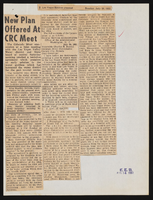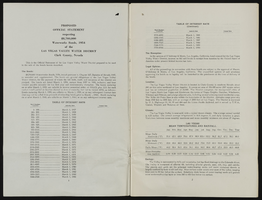Search the Special Collections and Archives Portal
Search Results

Transcript of interview with Edward Gregory by Jonathan Bellingar, March 2, 1977
Date
Archival Collection
Description
On March 2, 1977, Jonathan R. Bellingar interviewed Edward Gregory (born July 28, 1922) about his life in Nevada. The interview takes place at Nellis Air force Base; also present during the interview is an unidentified man. Gregory was born and raised in Nevada; he discusses leaving Nevada to serve in the Army during World War II before eventually returning to Nevada in 1950. The interview concludes with a brief overview of how Nellis Air force Base has changed since the 1950s.
Text
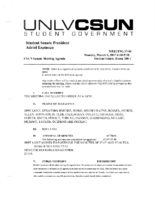
Meeting minutes for Consolidated Student Senate, University of Nevada, Las Vegas, March 05, 2007
Date
Archival Collection
Description
Text
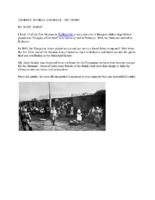
Biographical essay by Rudy Horst, 2014
Date
Archival Collection
Description
Rudy Horst was a prisoner at Auschwitz and was part of the Death March from Warso to Kutno, then transported to Dachau. He was liberated from the camp at Muldorf in 1944. He came to the United States in 1948.
Text
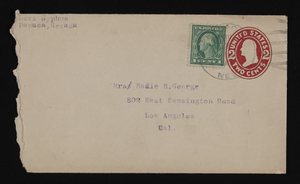
Correspondence, Levi Syphus to Sadie George
Date
Archival Collection
Description
Text

Emily McKinley interview, March 1, 1981: transcript
Date
Archival Collection
Description
On March 1st, 1981, Glorialyn Gutierrez interviewed Emily McKinley (b. April 28, 1930 in Las Vegas, Nevada) about her life in the Las Vegas Valley. McKinley begins by speaking about her childhood, her siblings and her extended family. McKinley gives a variety of anecdotes about being raised in Las Vegas, her family’s economic hardships and the house she grew up in. Lastly, McKinley talks about the businesses she owned with her husband, their hardships and her time working multiple jobs.
Text

Transcript of interview with Joe M. Wilcock by Claytee White, April 17, 18, & 30, 2014
Date
Archival Collection
Description
Chef and longtime gaming executive Joseph “Joe” Wilcock was born in Detroit and raised by his mother, Ruby, and stepfather, Ross Johnson, in Sarasota, Florida; Gary, Indiana; and Harlan, Kentucky. After he graduated from high school in Gary he moved to Chicago to attend Washburne Culinary Institute. While attending Washburne Joe worked at Chicago’s Drake Hotel and lived at the Sears YMCA. After earning his certificate from Washburne, Joe worked at the newly opened Holiday Inn in Chicago, the Sea View hotel in Bal Harbour, Florida, and a resort at Blowing Rock, North Carolina. At Blowing Rock he heard about the new School of Hotel Management at UNLV and in August 1969 23-year-old Joe headed for Las Vegas with $400 in his pocket. Las Vegas was a disappointment. Joe could not get a job as a chef without first joining Culinary Workers Union Local 226-which he could not afford to do. Also, because he ran a poker game and cooked at the Chuck Wagon Diner during high school his high school grade point average was roughly a C-, which hindered his admittance into the School of Hotel Management. Undaunted, Joe found a job bussing tables at the Frontier Hotel and joined the Culinary Union so he could work as a chef. He also took three classes at UNLV that semester, earned an A in each, and was admitted to the School of Hotel Management. While at UNLV he affiliated with Sigma Chi fraternity. In his career Joe has worked in all facets of the gaming industry in such Las Vegas properties as the Flamingo Capri, the Frontier, Caesars Palace, the Tropicana, the Dunes, the Golden Nugget, the Mirage, Treasure Island, the Sands, MGM, and the Downtown Grand. He learned the business from the ground up. He also worked at Caesars Tahoe and at different times owned and operated a sandwich shop and a bar. Joe married his wife, Linda, 38 years ago in Las Vegas, in 1976. He is currently employed as a casino shift manager at the Downtown Grand hotel and is affiliated with the House Corporation of Sigma Chi Alumni, UNLV Rebel Golf, the Las Vegas Natural History Museum, and Candlelighters Childhood Cancer Foundation of Nevada.
Text

Eric Calvillo interview, June 18, 2019: transcript
Date
Archival Collection
Description
Interviewed by Monserrath Hernández and Laurents Bañuelos-Benitez. Eric Calvillo was born into a Mexican American household in San Jose, California in 1980. As he recalls, it was there that his fixation with the colors and recurring themes of his family's Mexican roots told hold of his imagination. Today, this is core to his growing art career. Art has not been his sole ambition. Before moving to Las Vegas in 2005, Calvillo attended a San Francisco culinary school. He relocated to Las Vegas to complete his culinary internship at the prestigious Picasso restaurant at the Bellagio. Eventually, he began to pursue a professional art career as a painter of Día de los Muertos motifs and beautifully portray the Mexican tradition of celebrating the lives of the deceased. Through his use of acrylics and oil on canvas, Calvillo conveys the emotion of his culture and then, being a skilled carpenter, crafts his own frames.
Text

John Robinson Pacheco interview, June 24, 2019: transcript
Date
Archival Collection
Description
Interviewed by Laurents Bañuelos-Benitez. John Pacheco's father, Francisco, arrived in Las Vegas in 1942. John was born in 1947 and raised mostly on 27th Street. He is a graduate of Rancho High School and UNLV. He is a retired artist known for hand-painting signage for many local businesses. As a very civic minded person, John has received many local awards and served on committees for the Las Vegas Chamber of Commerce, East Las Vegas community, and much more.
Text

